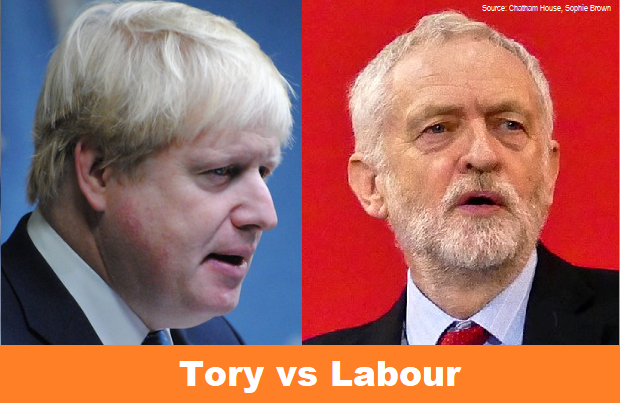Why did the Labour Party spend nearly double the amount of the Conservatives on their Facebook advertising campaigns, but still suffer a historical loss at the 2019 General Election? Could it be that Labour’s digital strategy played some part in the result? We gathered the advertising data made public by Facebook and Google’s political advertising transparency reports (Facebook Ad Library report and Google Transparency Report) and compared the performance of Labour and the Conservatives to look for hints.
After combining the Facebook Ads expenditure of all Facebook Pages managed by the two parties we found that Labour spent nearly £1.8 million, while the Conservatives spent little more than £0.9 million.
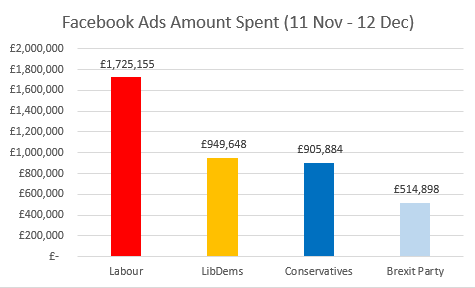
Next, we checked how many ads each party ran in total.
While the Conservatives ran around 13,000 ads, Labour only ran around 8,000 despite the higher budget.
In the digital advertising universe, this stark difference may indicate two things:
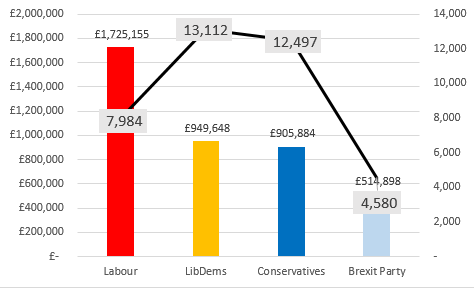
Firstly, it could suggest that Labour didn’t put enough effort into optimising their Facebook Ads campaigns for efficiency. The same digital campaign could cost less if it is adjusted to reduce waste (e.g. by proactively reducing unnecessary clicks). Digital advertising platforms discourage spammy ads by charging more for what its algorithms consider irrelevant content for the platform’s users, according to various criteria. One could argue that these algorithms might be flawed and may have contributed to a bias.
Secondly and similarly, it could show that Labour didn’t test as many ads as the Conservatives within each Facebook campaign. Even if the cause for the relatively higher cost could have been attributed to an algorithmic bias, the low amount of ads per page probably means that there was no aggressive effort to fix it. It is by now a best practice in online advertising to test different parts of an ad to craft a winning message.
Thus, it is quite possible that Labour did less than the Conservatives to test and learn which message works best for their audiences.
If we rank all Facebook Pages of the two parties by spend per ad, the findings are striking.
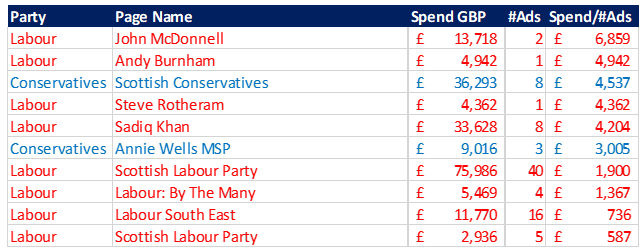
Eight out of the top ten spenders are Labour pages. The top spender is John McDonnel’s page, spending nearly £14,000 on just two ads. John McDonnel held his seat of Hayes and Harlington, but lost 10.7% compared to the vote share from the previous election.
It is followed by the pages of Andy Burnham and Steve Rotheram, the mayors of Greater Manchester and Liverpool, at nearly £5,000 and £4,400 respectively. Both ran a single ad for just two days leading up to the election day promoting to vote for Labour. Labour lost five constituencies in Greater Manchester to the Conservatives. The seats in Liverpool were held, but there were losses of vote share for Labour.
Although several individual Labour Facebook Pages do appear to have tested multiple ads, the average number of ads across their 385 Facebook Pages is 20, whereas for the Conservatives, there were an average of 64 ads across a total of 195 pages.
On the Conservatives side, we looked at the efforts of new MPs who gained a seat.
Notable examples included Joy Morrissey, who had run a good 54 ads for only around £800. She won the seat held by now independent Dominic Grieve to become MP for Beaconsfield. Nicola Richards spent only £192 on 21 ads to gain 8.5% compared to the party’s previous vote share in West Bromwich East to become the UK’s youngest MP.
These figures indicate that these Conservative candidates may have put more effort into testing which ads and which messages worked best, and that it probably paid off.
Finally, if we rank the Facebook Pages of the two parties by total advertising spend, the proportions are similar.
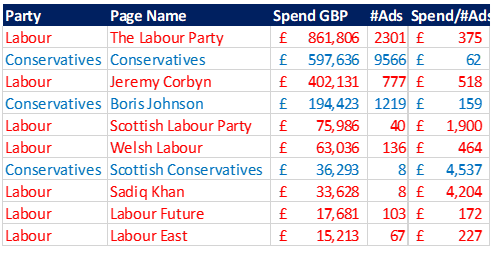
Both the main party and the party leader pages of Labour ran significantly less ads, but on average spent significantly more per ad than the Conservatives’ equivalent pages. Although Boris Johnson held the Conservative seat for Uxbridge and South Ruislip, he gained a 1.8% higher vote share compared to the previous election. Conversely, Jeremy Corbyn, who also held his Labour seat for Islington North, lost 8.7% of his vote share.
Even if political advertising on Facebook or other digital platforms is not the only ingredient to winning an election, we believe that it is worth taking note and looking deeper into the reasons for the stark difference between the amount of ads run by Labour and by the Conservatives.
Another interesting difference between the two parties can be found on the Google Ads political transparency report (note: the Google report data is less accessible and has no ad statistics for the UK General Election at the time of writing).
While Labour appears to have spent around £15-25k per day on Google Ads and then gradually increased spend from November 26th, the Conservatives were more aggressive here, going well above £100,000 per day from that date.
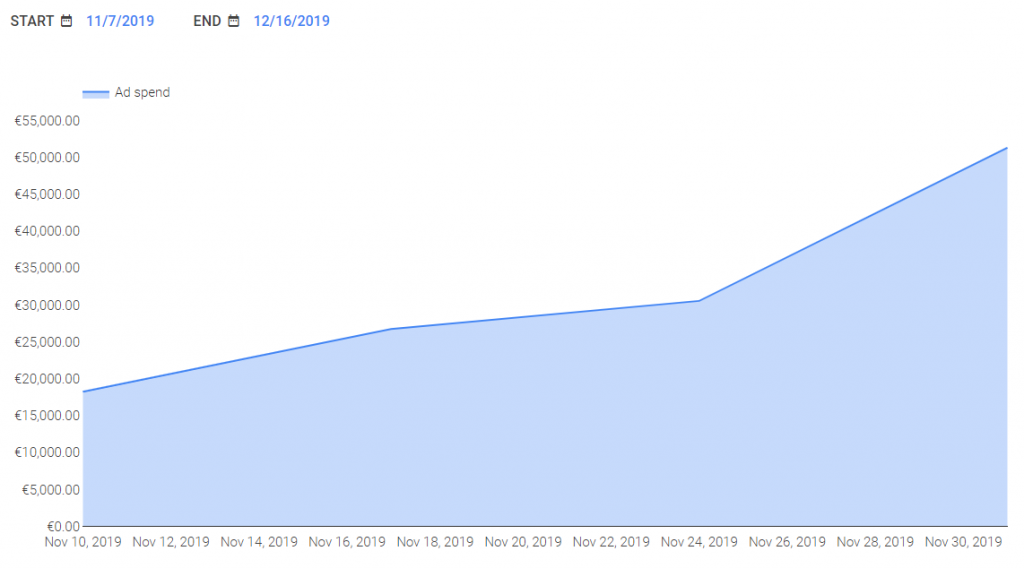
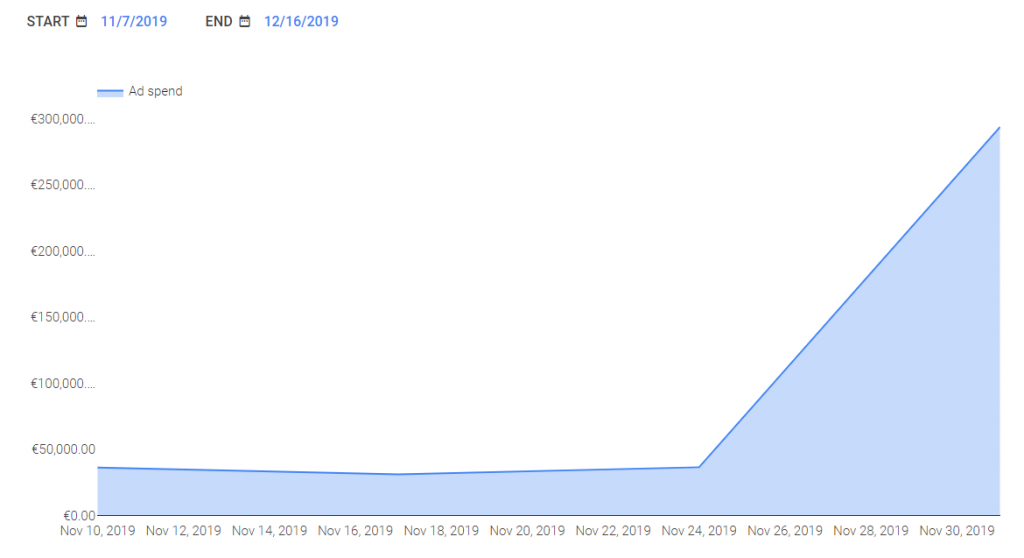
Google Ads is seen by many as a more accurate platform to target the right audience efficiently, because most of the ads appear to people who go to Google and search specifically about topics related to the campaign, whereas Facebook Ads could also appear to people who are not interested.
Testing and learning with digital ads should be a priority if a political party truly wants to connect with the people and better understand which messages resonate with them.
About Worldacquire
Worldacquire is a political tech firm in London providing digital strategy, advertising and analytics solutions. We managed election campaigns in Hong Kong, contributing to the 2019 landslide pro-democracy victory, and in Thailand, supporting one of the country’s first LGBTQ+ candidates, using technology to cut through electoral red tape. At the United Nations Internet Governance Forum, we called for a fair and balanced regulation of online political advertising and greater transparency of other sources of digital manipulation. We work with governments, think tanks, intergovernmental organizations and social ventures to understand and apply digital technology, A.I. and algorithms effectively and ethically.
